Personal Details
Liu Yanping
Post-Doc Fellow
Institute of Psychology, Chinese Academy of Sciences
Phone: (+86) 135 7027 2578
E-mail: yanping0000@gmail.com
Born: August 01, 1982 in Hunan, China
EDUCATION
- Ph.D in Cognitive Psychology, Sun Yat-Sen University, 2006-2012.
“Dynamic attention allocation during reading”
(Dissertation Supervisor: Dr. Erik Reichle & Dr. D.-G, Gao)
- Joint Ph.D Program, University of Pittsburgh, 2009-2010.
- BS in Psychology (major) and Computer Science (minor), Sun Yat-Sen University, 2001-2005.
SUMMER SCHOOL, WORKSHOP & SYMPOSIUM
- Understanding Biological Vision: Theory, Data, and Models, summer semester course in Beijing, July 01-13, 2012.
- The 3rd Beijing International Symposium on Computational Neuroscience, July 13-14, 2011.
- Advanced fMRI Course for Basic and Applied Research in Guangzhou, November 17-20, 2010.
- Public Administration and Complex Science, sponsored by Ministry of Education and National Natural Science Foundation of China in Xi’an, July 14-27, 2009.
- Workshop on Cognitive Science: From Cellular Mechanisms to Computational Theories in Beijing, 2009.
- The 1st Cognitive Neuroscience Conference in Beijing, 2006.
ACADEMIC EMPLOYMENT HISTORY
- Consultant (i.e., assistant) for Prof. Erik Reichle in University of Pittsburgh, USA, 2011-2012.
- Post-doctoral fellow, Institute of Psychology, Chinese Academy of sciences, 2013-
INTERESTS
- (1) Attention; (2) eye-movement control; (3) language processing; (4) learning; (5) reinforcement; (6) computational cognition/neuroscience (e.g., connective, probability or spiking models); and (7) neural basis of machine learning in higher-order linguistic processing.
GRANTS, HONORS & AWARDS
- Chinese scholar fellowship sponsored by China Scholarship Council, 2009-2010.
PEER-REVIWED JOURNAL ARTICLES
Representative publications
- Liu, Y., Reichle, E.D., & Gao, D.-G. (In press). Using reinforcement learning to examine dynamic attention allocation during reading. Cognitive Science. 2013 Feb 21. doi: 10.1111/cogs.12027. (supplemental materials: http://www.pitt.edu/~reichle/materials.html)
- Reichle, E. D., Liu, Y., & Laurent, P. A. (2011). The emergence of adaptive eye movement control in reading: Theory and data. Studies of Psychology and Behavior, 9, 45-52.
- Liu, Y., & Reichle, E. D. (2010). The emergence of adaptive eye movements in reading. In S. Ohlsson & R. Catrabone (Eds.), Proceedings of the 32nd Annual Conference of the Cognitive Science Society (pp. 1136-1141). Austin, TX: Cognitive Science Society.
Other publications
- O’Mara, E. M., Gaertner, L., Sedikides, C., Zhou, X.-Y., & Liu, Y. (2012). A longitudinal-experimental test of the panculturality of self-enhancement: Self-enhancement promotes psychological well-being both in the west and the east. Journal of Research in Personality, 46, 157-163.
- Fa, Z.-Q., Zhang, R., Li, P., Zhang, J., Zhang, P., Zhu, S.-F., Wu, Q., Huang, F.-H., Liu, Y., Yang, L.-J., Chang, H. -G., Wen, Z.-B., Gao, D.-G., Zeng, Y.-J., Jiang, X.-D. (2011). Effects of temporarily disrupting BBB on activity-induced manganese-dependent functional MRI. Brain imaging and behavior, 5, 181-188.
- He, L-N., Feng, C., Liu, Y., & Zhou, X.-Y. (2010). The pursuit of optimal distinctiveness and consumer preferences. Scandinavian Journal of Psychology, 51, 411-417.
Manuscripts in Preparation
- Liu, Y., & Reichle, E.D. (in prep.) Using reinforcement learning to examine adaptive eye movement in un-spaced language.
- Liu, Y., & Reichle, E.D. (in prep.) An evolutionary algorithm for error-driven learning via reinforcement.
- Liu, Y., (in prep.) Zoom in or out? Using reinforcement learning to examine adaptive attention control.
- Liu, Y., & Huang, R. (in prep.) Flexible word-like segmentation in visual search: insight from eye movement study.
CONFERENCE PRESENTATIONS
- Liu, Y., & Reichle, E. D. (2010, August). The emergence of adaptive eye movements in reading. Paper presented at the Annual Meeting of the Cognitive Science Society, Portland, OR, USA.
CAPABILITIES
Experimental design
- Developing or using software (e.g., E-prime, Presentation, Psychotoolbox on Matlab and eye-track related tools, etc.) for behavioral and phychophysiological (e.g., EEG, fMRI) experiments.
Statistics
- Basic and advanced statistical models (e.g., mixed model, SEM, etc.).
- Programming or using available software (e.g., EEGLAB, SPM) to analyze biological signals (e.g., EEG, fMRI).
Computational modeling
- Neural network or probability modeling for eye movement control in reading.
- Higher-order linguistic processing modeling (e.g., using random walk model to simulate sematic memory retrieval),
- Probability inference (e.g., concept learning).
Machine learning
- Reinforcement learning.
- Statistical (e.g., Bayesian) machine learning.
- Using machine learning techniques (e.g., SVM) to build models on fMRI signals.
OTHER CERTIFICATES
- Software developer (China), 2005.
- The top rank (i.e., 4th rank) in National Computer Rank Examination (China), 2005.
- The band 6th in College English test Band 4 and Band 6 (China), 2005.
OTHER EXPERIENCES
- Developed a web-based personality assessment tool for Dr Fan’s recruitment research in Auburn University (The accomplishment published on Journal of Applied Psychology, “Testing a new procedure for reducing faking on personality tests within selection contexts”), 2005-2012.
- Developed software in assessing concentration intelligence for Wrigley, 2007.
SPOKEN LANGUAGES
- Mandarin, Cantonese, English.
PROGRAMMING LANGUAGE (in Linux & Windows)
- Java, C, C++, Objective-C, Python, MATLAB, R, SQL (e.g., MySQL & SQL server), PHP, JavaScript, VbScript.

